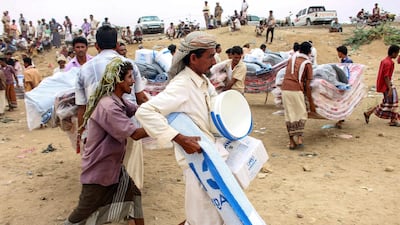The UN Security Council's five permanent members (P5) on Tuesday said Yemen's peace process could fail if more commitment isn't shown toward the implementation of the deal.
Yemen’s government and members of the Houthi group agreed to a ceasefire and the withdrawal of troops from the port city of Hodeidah in December, during UN-led peace talks in Sweden.
But progress has been slow, with the Yemeni government blaming the Houthi rebels for hindering the process.
The government has also called on UN Special Envoy, Martin Griffiths, to put more pressure on the Houthis.
“We call on all sides to ensure the UN monitoring mission can carry out its work safely and without interference,” ambassadors from the UK, US, France, Russia and China said in a statement.
Yemen’s warring sides must ensure that the UN can carry out its work “safely and without interference” in order to complete the implementation of the deal.
“We strongly support the efforts of Mr Griffiths, and the Head of the United Nations Mission in Hodeidah, Michael Lollesgaard, to secure the earliest possible implementation of the arrangements agreed in Stockholm for redeployment from the ports and city of Hodeidah,” said the statement.
Members of the P5 urged to bring the implementation of the proposal “in good faith without further delay and without seeking to exploit the re-deployments by the other side.”
The officials also expressed concern regarding Yemen’s deteriorating humanitarian situation, including the shelling of the Red Sea Mills and the fierce fighting in Hajja governorate.
The statement comes as the UN office for the Coordination of Humanitarian Affairs (OCHA) said on Tuesday that thousands of Yemenis are trapped and caught in clashes in the northern district of Hajja.
“It is outrageous that innocent civilians continue to die needlessly in a conflict that should, and can be solved,” said Lise Grande, the UN humanitarian coordinator in Yemen.
Yemen's war has killed thousands of civilians and left millions on the brink of famine and starvation.
The number of displaced civilians in Hajja has doubled over the last six months, OCHA said.
Houthi rebels imposed control over Hajja's northern districts after a local tribe took up arms against them.
The tribesmen, in deal with the rebels, have remained neutral in the war. The deal collapsed when the Houthis attempted to use the district to transfer weapons to a coastal area where they have been fighting against the Arab coalition.


